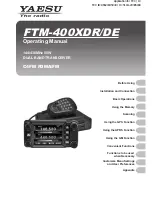
INSTR, INSTL, DXSR-1504,1508/EC
Linear P/N: 215648 D
Material: 20 Lb. Mead Bond
Size: 8.500" x 11.000"
Ink: Black
Scale: 1-1
Side 1 of 2
DXSR-1504/EC
DXSR-1508/EC
SUPERVISED
DIGITAL RECEIVERS
Installation Instructions
PRODUCT DESCRIPTION
The DXSR-1504/EC and DXSR-1508/EC are four and eight channel supervised digital receivers with solid state outputs
designed for use with Linear’s DX and DXS Format /EC transmitters. These receivers can be used in a variety of security
and remote control applications. When the receiver detects a signal from a transmitter programmed into its memory, the
appropriate channel output activates. The channel outputs have three optional configurations; 3/4 second momentary,
toggle on/off, and latch until restored. Status and low battery outputs are for supervisory indications. Cutting jumpers select
which channels require supervisory status reports from transmitters.
Each unit incorporates a high-sensitivity superheterodyne diversity receiver with two whip antennas. This type of receiver
provides superior performance by preventing loss of signal due to multi-path interference.
In a typical installation, the receiver is connected to an alarm control panel, door strike, camera, high current relay or some
other devices. Transmitters are used to activate or control the devices. The receiver should be mounted indoors or inside
a weather resistant
non-metallic
housing for outdoor use.
The digital DX/DXS code format features over a million possible codes. The transmitters are precoded at the factory to
unique codes, so no field coding is required. For versatility,
any transmitter can be programmed into any receiver channel.
Receivers must be programmed to recognize the transmitter’s code before system testing and operation. Up to 32
transmitters can be programmed into the receiver. Each button on multi-button portable transmitters send a unique code,
and are programmed as separate transmitters.
The CHANNEL display shows the channels activated and the presence of radio activity. Individual indicators for ALARM,
STATUS, and LOW BATT show the supervisory status of each receiver channel. All outputs can be configured for normally
open or normally closed.
The units can be powered from a 10.2-14.4 VDC or 12-16 VAC power source. The units will draw about 35 mA standby
and up to 120 mA in alarm.
FEATURES
COMPONENT LOCATIONS
OPTION JUMPERS AND CHANNEL BUTTONS DETAIL
MOUNT RECEIVER
ATTACH ANTENNAS
CONNECT TERMINALS
(760) 438-7000 • FAX (760) 438-7043
www.linearcorp.com
CHANNEL BUTTON
ACCESS PANEL
CHANNEL
DISPLAY
ALARM, STATUS,
& LOW BATTERY
INDICATORS
CASE LOCKING
SCREW
OPEN CASE TO
VIEW COMPONENTS
LEFT ANTENNA
TERMINAL
CHANNEL
DISPLAY
ALARM
INDICATOR
STATUS
INDICATOR
LOW BATTERY
INDICATOR
RADIO ACTIVITY
INDICATOR
RIGHT ANTENNA
TERMINAL
AUDIO TEST
POINT
GROUND
TEST POINT
OUTPUT POLARITY
JUMPER
PROGRAM
JUMPER
TERMINAL
BLOCK
WIRING STRAIN
RELIEF POSTS
RECESSED WIRING
ACCESS HOLE
CHANNEL
BUTTONS
OUTPUT
JUMPERS
STATUS
JUMPERS
CHANNEL 1
CHANNEL 2
CHANNEL 3
CHANNEL 4
CHANNEL 5
CHANNEL 6
CHANNEL 7
CHANNEL 8
DXSR-1508 ONLY
CHANNEL
BUTTON
OUTPUT
JUMPER
STATUS
JUMPER
CHANNEL BUTTONS ARE USED DURING PROGRAMMING AND
TO UNLATCH THE CHANNEL'S OUTPUT IN LATCHED MODE
OUTPUT JUMPERS SELECT MOMENTARY, TOGGLE, OR
LATCHED OUTPUT FOR EACH CHANNEL
WHEN A CHANNEL'S STATUS JUMPER IS CUT, THE CHANNEL
WILL REQUIRE STATUS TRANSMISSIONS FROM A SUPERVISED
TRANSMITTER PROGRAMMED INTO THAT CHANNEL
MOUNT RECEIVER AS HIGH
AS PRACTICAL USING
THE SCREWS AND SCREW
ANCHORS PROVIDED
COVER THE SCREWS WITH THE
FOUR SCREW HOLE PLUGS PROVIDED
INSTALL THE TWO
ANTENNAS UNDER THE
LEFT AND RIGHT
ANTENNA TERMINALS
TIGHTEN ANTENNA TERMINALS WITH
ANTENNA WHIPS ABOVE THE SCREW
AND UNDER THE TERMINAL PLATE
AS SHOWN (BE SURE CASE COVER
SLOTS ALIGN WITH ANTENNAS)
NEG
+12V
LOW BAT
STAT
CH1
CH2
CH3
CH4
COM
CH5
CH6
CH7
CH8
COM
MODEL DXSR-1508 ONLY
SECURE WIRES WITH ZIP-TIE
FROM POWER SOURCE
10.2-14.4 VDC OR 12-16 VAC
120 mA MINIMUM
OUTPUTS TO DEVICE TO BE TRIGGERED
100 mA MAXIMUM PER OUTPUT
WITH OUTPUT POLARITY JUMPER IN
PLACE, ALL OUTPUTS WILL SWITCH
TO COMMON WHEN ACTIVE
NOTE: SEE WIRING EXAMPLES ON
REVERSE SIDE OF THESE INSTRUCTIONS




















